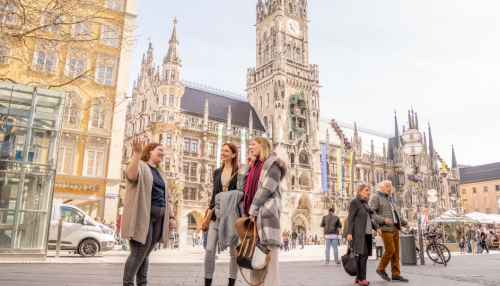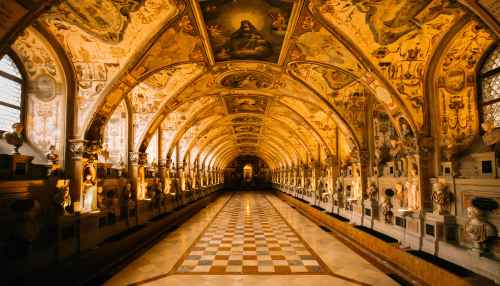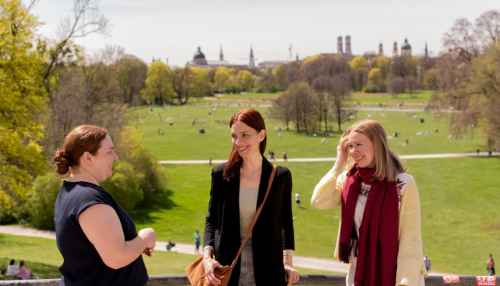Table Of Contents
- What Is Munich Best Known For?
- The Architecture That Tells Munich's Real Story
- Green Spaces That Put Other Cities to Shame
- Cultural Life Beyond the Tourist Trail
- Food Culture: More Than Sausages and Pretzels
- Sports and Modern Munich
- The Munich Nobody Talks About
- Munich's Position in German History
- Planning Your Munich Experience
- The Real Answer to "What Is Munich Known For?"
- Why Munich Matters
- What Makes Munich Special Throughout the Seasons
- Munich's Economic Reality Behind the Tourist Facade
Munich isn't just Bavaria's largest city; it's Germany's third largest city, and frankly, we're doing just fine without trying to be Berlin or Hamburg. We've got our own thing going on, and it's more complex than most people realize.
What Is Munich Best Known For?
The Beer Culture That Actually Matters
Yes, Munich is famous for beer. But not in the way you think.
Sure, Oktoberfest draws millions of visitors every year, turning our city center into a tourist circus for a few weeks. But the real beer culture in Munich happens year round in places most visitors never discover. We're talking about neighborhood beer garden spots where German citizens actually hang out, not the Instagram-ready tourist traps.
The thing about Munich's beer halls is that they're not museums. Places like Augustiner-Bräu or Löwenbräukeller aren't performing Bavaria for tourists – they're serving Bavarian beer to people who've been coming here for decades. You want authentic? Skip the famous glockenspiel crowds and find a beer hall in the old town where the waitresses call you "Schatzi" and mean it.
Beyond the Beer Festival Madness
Here's a fun fact most people don't know: Munich's beer culture predates Oktoberfest by centuries. We've been brewing Bavarian beer since the middle ages, long before King Ludwig II decided to throw a party that got wildly out of hand.
The beer taverns scattered throughout central munich tell the real story of our relationship with beer. It's not about getting drunk in a costume – it's about community, conversation, and yes, really good beer that happens to pair perfectly with traditional Bavarian sausage and pork knuckles.
The Architecture That Tells Munich's Real Story
Gothic Grandeur and Bavarian Baroque
Walk through Munich's old town and you're not just seeing pretty buildings – you're reading German history written in stone. The new town hall with its famous glockenspiel isn't just a tourist attraction; it's a 19th century statement about Munich's importance in Bavaria and beyond.
The centuries old buildings here survived World War II better than many German cities, which means you're seeing authentic medieval and baroque architecture, not reconstructions. The old town hall, the Theatine Church, and several palaces like Schloss Nymphenburg represent different eras of Bavaria's evolution from medieval town to present-day Munich.
The Palaces That Prove Munich's Royal Past
King Ludwig II might be more famous for Neuschwanstein Castle in the Bavarian Alps, but Munich's Nymphenburg Palace tells a more intimate story about Bavarian royalty. This isn't just one of the largest palace complexes in Germany – it's where you can actually understand how Munich became the capital city of Bavaria.
Fun fact: The state collection housed in various Munich palaces contains some of the most important German art pieces you'll find anywhere. But unlike Berlin's crowded museums, Munich's cultural venues let you actually appreciate what you're seeing.
Looking for a private city experience in Munich?
Explore the city with a local who plans a private day just for you; no groups, no scripts.
Green Spaces That Put Other Cities to Shame
The English Garden: More Than Just a Park
Every Munich local has opinions about the English Garden, and mine is this: it's one of the largest urban parks in the world, and we still manage to find quiet spots away from the tourist crowds.
The Eisbach wave in the English Garden draws surfers year round – yes, river surfing in southern Germany. The Eisbach river creates a standing wave that's become a symbol of Munich's unconventional side. Watching people surf in the middle of the city never gets old, even for locals.
Parks That Actually Serve the Community
Munich's green spaces aren't just for show. The beer garden culture thrives here because we have places like the English Garden where you can spend an entire rainy day under the trees, or sunny afternoons that stretch into evening around the Isar River.
The Isar River cuts through Munich in a way that gives the city breathing room. Unlike many German cities where rivers feel like afterthoughts, Munich's relationship with the River Isar is integral to how we live here.
Cultural Life Beyond the Tourist Trail
Opera, Museums, and the Arts Scene
The Bavarian State Opera isn't just any opera house – it's one of the most important cultural venues in Germany, and locals actually attend performances here. Unlike cities where opera houses cater mainly to tourists, Munich's cultural scene serves the people who live here.
The Deutsches Museum remains one of the largest science and technology museums in the world, but what makes it special is how it connects to Munich's industrial history. This isn't random science exhibits – it's the story of how southern Germany became an industrial powerhouse.
Art Collections That Matter
The Alte Pinakothek houses one of the oldest galleries in the world, but here's what guidebooks won't tell you: it's actually enjoyable to visit. The building itself, the way the collection is organized, the fact that you're not fighting crowds to see famous paintings – it all works.
Munich's approach to preserving and displaying German art feels organic rather than forced. The state collection spreads across multiple venues, which means you can dive deep into specific periods or artists without feeling overwhelmed.
Food Culture: More Than Sausages and Pretzels
What Munich Food Actually Tastes Like
Yes, we eat white sausage (weisswurst) and yes, we take it seriously. But Munich's Bavarian cuisine extends far beyond tourist-friendly sausages. The cured meats, the way we prepare pork knuckles, the minced veal in traditional dishes – it's all connected to Bavaria's agricultural history and geography.
Here's what visitors miss: Munich's food culture adapts without losing its identity. You'll find traditional Bavarian dishes alongside modern interpretations, but the good places – the ones locals frequent – maintain the techniques and ingredients that make Bavarian cuisine distinctive.
Markets and Food Traditions
The food markets in Munich's city centre aren't performing tradition for tourists. Viktualienmarkt has been serving Munich residents for over 200 years, and it still functions as a real market where people shop for daily meals.
The seasonal approach to food here connects directly to bavaria's climate and agricultural cycles. When you eat traditional Bavarian food in Munich, you're not just consuming calories – you're participating in a system that's evolved over centuries to work with local conditions.
What if your day in Munich was planned by someone who knows it — and you?
City Unscripted matches you with a local host who creates a private experience based on your interests, not a set route.
Sports and Modern Munich
Football Culture and the Allianz Arena
FC Bayern Munich plays at the Allianz Arena, which locals simply call "the arena." This isn't just about football – it's about how Munich balances tradition with modernity. The stadium's design, the way it lights up, the technology integrated into the experience – it represents modern Munich as much as any tech company or research facility.
The 1972 Olympics left Munich with the Olympic Park and Olympic Stadium, but more importantly, they marked Munich's emergence as a modern German city. The city hosted these games during a crucial period in west germany's development, and the infrastructure built then still serves Munich today.
Why Munich Works as a Modern City
Munich's success comes from integrating old and new without destroying either. The S-Bahn connects historic neighborhoods with modern districts. Public buildings serve contemporary needs while respecting architectural heritage. Green spaces provide recreation and environmental benefits while preserving the beer garden culture that defines Munich social life.
The Munich Nobody Talks About
Daily Life in a Tourist City
Living in Munich means navigating a city that's simultaneously your home and everyone else's vacation destination. We've learned to time our grocery shopping, choose our routes, and find our quiet spots based on tourist seasons and patterns.
The real Munich exists in the neighborhoods tourists don't visit, in the routines that have nothing to do with sightseeing, in the conversations that happen in local dialects rather than tourist-friendly German.
What Locals Actually Do
Munich residents use the same spaces tourists visit, but differently. We know which beer garden has the best atmosphere on different days of the week. We know when the English Garden is peaceful and when it's overrun. We know which cultural venues offer the best value and which ones are tourist traps.
The fun fact is that Munich locals have learned to live alongside tourism without being consumed by it. Our daily rhythms accommodate visitors without revolving around them.
Munich's Position in German History
World War II and Recovery
Munich's role in german history includes darker chapters that shaped the city's current character. Adolf Hitler's early political activities began here, and the city's recovery after World War II reflects broader patterns in west germany's reconstruction.
Understanding Munich requires acknowledging these historical layers. The city's current prosperity and cultural vitality didn't happen in a vacuum – they developed through decades of conscious choices about how to remember the past while building the future.
Modern Germany's Third Largest City
Munich's position as Bavaria's capital city and Germany's third largest city gives it influence that extends far beyond tourism. The Bavarian state parliament meets here. Major German companies base their operations here. The city's decisions affect southern germany's economic and cultural development.
Tip
We match you with the right host, not just any guide.Want to experience the real Munich with someone who lives there?
A fully private experience, planned and led by a local host who tailors the day to you
Planning Your Munich Experience
When Tourism Meets Reality
If you're planning to visit Munich, understand that you're entering a living city, not a theme park. The best Munich experiences happen when you respect local rhythms rather than imposing tourist expectations.
Getting Beyond the Surface
Munich rewards visitors who dig deeper than the obvious attractions. The city's complexity – its blend of tradition and innovation, its role in german history, its position in contemporary Germany – becomes apparent when you look beyond the postcards.
Working with a knowledgeable Munich tour guide can help you understand these layers, but ultimately, appreciating Munich requires recognizing that what makes the city special isn't separate from what makes it challenging.
The Real Answer to "What Is Munich Known For?"
Munich is known for being a city that works. The beer culture, the architecture, the green spaces, the cultural venues, the food, the sports, the history – it all functions together in ways that serve both residents and visitors.
The traditional Bavarian elements aren't museum pieces – they're living parts of contemporary Munich life. The modern infrastructure isn't imposed on the historic city – it's integrated with existing patterns and rhythms.
Why Munich Matters
Munich's significance extends beyond Bavaria or even Germany. As one of the largest cities in a country that's central to European Union politics and economics, Munich's success or failure affects broader regional stability and prosperity.
The city's approach to balancing preservation with development, tradition with innovation, local needs with international pressures offers lessons for urban planning and cultural policy throughout Europe.
But for those of us who live here, Munich matters because it's home. It's the place where centuries old buildings house contemporary businesses, where beer garden conversations solve world problems, where the Isar River provides year round recreation opportunities, and where you can surf in the middle of the city on a rainy day.
Fun fact: Munich consistently ranks among the world's most livable cities, but what those rankings don't capture is the particular combination of factors that makes Munich work. It's not just about economic prosperity or cultural offerings – it's about how all the pieces fit together.
The question "what is Munich known for" has a simple answer and a complex one. Simply: beer, Bavaria, and beautiful architecture. But the complex answer involves understanding how Munich navigates the challenges of being simultaneously a historic Bavarian town, a modern German city, a European cultural center, and a global tourist destination.
And honestly? Most days, it does all of that pretty well.
Munich remains Bavaria's largest city and Germany's third largest city not by accident, but because it continues to evolve while maintaining the qualities that make it distinctive. Whether you're here for Oktoberfest or the Bavarian State Opera, the Allianz Arena or the Deutsches Museum, the beer halls or the green spaces, Munich offers experiences that feel both authentically Bavarian and genuinely contemporary.
That's what Munich is really known for: being itself, without apology or compromise, in a world that often demands cities choose between tradition and progress. Here, we've figured out how to have both.
Ready to plan your perfect day in Munich?
Start your experienceWhat Makes Munich Special Throughout the Seasons
Summer: When the City Truly Comes Alive
Summer in Munich transforms the entire city into an outdoor living room. The English Garden fills with sunbathers, football players, and families claiming their spots under centuries-old trees. Beer garden season reaches its peak, with every neighborhood establishment opening their outdoor spaces to accommodate locals and visitors alike.
The Eisbach wave becomes a daily spectacle during summer months, with surfers creating an impromptu community around this urban anomaly. What started as a few locals taking advantage of the standing wave has evolved into a year round attraction that perfectly captures Munich's unconventional spirit.
The city's green spaces prove their worth during summer heat waves. Unlike other major German cities where concrete dominates, Munich's extensive park system and the Isar River provide natural cooling and recreation opportunities. The beer garden culture makes perfect sense when you experience a Munich summer – sitting under chestnut trees with a cold Bavarian beer while the city bustles around you.
Winter: The Munich Tourists Don't See
Winter Munich reveals the city's true character. When the tourist crowds thin out and the weather forces everyone indoors, you discover the cozy beer halls that locals actually frequent. The famous glockenspiel still chimes in Marienplatz, but the crowds dispersing quickly in the cold means you can actually appreciate the new town hall's architecture without fighting for photo opportunities.
The Christmas markets transform central munich into something magical, but the real charm happens in neighborhood markets where vendors know their regular customers. Glühwein tastes better when you're drinking it with people who live here year round, not just visitors collecting Instagram moments.
Winter also reveals Munich's indoor cultural life. The Bavarian State Opera and other cultural venues become gathering places for German citizens who appreciate having world-class performances in their hometown. The Deutsches Museum offers the perfect rainy day retreat, while art lovers can spend hours in the Alte Pinakothek without the summer crowds.
Munich's Economic Reality Behind the Tourist Facade
The Business Side of Bavaria's Capital
Munich's economy extends far beyond tourism and traditional Bavarian industries. As the capital city of Bavaria, Munich hosts the Bavarian state parliament and serves as the political center for Germany's most economically powerful state. The city's population includes professionals working in technology, finance, and manufacturing – industries that rarely make it into tourist brochures.
The presence of major corporations and research institutions makes Munich one of Germany's most expensive cities, but also one of its most prosperous. This economic reality shapes everything from housing costs to restaurant prices, creating a city where traditional beer halls coexist with upscale dining establishments serving international cuisine.
Munich's position in southern Germany makes it a natural hub for business relationships with Austria, Switzerland, and Northern Italy. The city's economic influence extends throughout the region, affecting everything from transportation infrastructure to cultural programming.
Innovation Within Tradition
What makes Munich economically interesting is how it maintains its Bavarian identity while embracing modern industries. The city hosted the 1972 Olympics, which required massive infrastructure investments that continue to benefit Munich today. The Olympic Park and Olympic Stadium remain functional parts of the city's recreational and cultural landscape.
The Allianz Arena represents Munich's approach to major projects – architecturally striking, technologically advanced, but designed to serve the community long-term rather than just make a statement. This balance between innovation and sustainability reflects Munich's broader approach to urban development.
Munich's success as a modern German city comes from recognizing that economic prosperity and cultural preservation aren't mutually exclusive. The centuries old buildings in the old town house contemporary businesses. The traditional Bavarian cuisine adapts to modern dietary preferences without losing its essential character. The beer culture evolves to include craft brewing and international beer styles while maintaining its social and cultural functions.
Fun fact: Munich consistently attracts international businesses not just because of its location or infrastructure, but because of its quality of life. The combination of cultural offerings, green spaces, and Bavarian lifestyle creates an environment where people want to live and work. This isn't accidental – it's the result of decades of conscious urban planning that prioritizes livability alongside economic development.
What if your day in Munich was planned by someone who knows it — and you?
City Unscripted matches you with a local host who creates a private experience based on your interests, not a set route.
Want to experience the real Munich with someone who lives there?
A fully private experience, planned and led by a local host who tailors the day to you
Meet Your Munich Hosts
A personalized way to explore Munich’s must-see landmarks beyond the tourist crowds.











